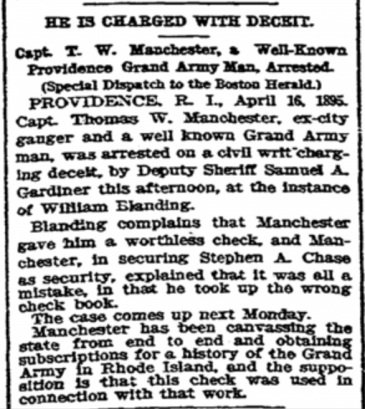This leatherette-bound 1863 diary was kept by Thomas Wilbur Manchester (1841-1928) of Providence, Rhode Island. He was the son of Thomas and Sally A. (Carpenter) Manchester. I have not been able to find a biographical sketch for Thomas so the following was cobbled together from on-line records. Thomas’ siblings who are mentioned in this diary include Mary A. Manchester (b. 1832), Orinda Carpenter Manchester (1833-1927), Sarah Westcott Manchester (1839-1924), and Emily Manchester (b. 1843). Orinda was married to Andrew Jackson Howard (1830-1863), and Sarah was married to William Penn Spink.
Thomas was married on 1 September 1861 to Martha (“Mattie”) Elizabeth Nean (1841-1921). She was the daughter of Walter B. Nean and Sypha Calista Hollister (1808-1895) of Glastonbury, Connecticut. The marriage occurred immediately after Thomas returned from his first experience as a soldier in Co. A, First Rhode Island Infantry. This regiment was raised in April after the firing on Fort Sumter and was attached to Burnside’s Brigade in McDowell’s Army of Northeastern Virginia. They saw action at the Battle of First Bull Run on 21 July 1861, spearheading the initial Federal assault and fight for Matthew’s Hill, but then fell back in the general withdrawal. The regiment soon returned home to be mustered out on 2 August 1861.

Guidon of Co. L, 1st Rhode Island Cavalry
Four months later, on 4 December 1861, Thomas enlisted in Company L, 1st Rhode Island Cavalry. He eventually became the commissary sergeant in the 2nd Battalion of the regiment which seems to have taken him out of the saddle and onto a wagon seat with the regimental supply wagons. We don’t know much about his service with the 1st Rhode Island Cavalry until this diary begins in March 1863 — after 14 months of duty — with the regiment encamped at Potomac Creek Station. After accompanying his regiment on an excursion to Morrisville, Virginia, in mid-April 1863, Thomas returned to the old campground on Potomac Creek and then appears to have gone on furlough or possibly even “French Leave” — though I’m inclined to believe it was the former. The diary pages from April 19th until the 30th have been torn out, presumably because they contained embarrassing or incriminating detail the author wished later to conceal. By May 1st, he was visiting cousins in Philadelphia before returning to home to Providence.
In late May, after spending some six weeks or more visiting family and friends in Philadelphia, New York, and Providence, Thomas returned to his regiment in Virginia and was immediately arrested by his commanding officer. If he had deserted his regiment, I believe the punishment would have been more severe. But Thomas summed up the event by simply stating, “Was arrested by Lt. Col. Thompson in morning. Released in one hour.” This seems to be more consistent with overstaying one’s furlough rather than desertion. In any event, Thomas did not stay with the regiment but returned to Washington D. C. to await his discharge papers from the First Rhode Island Cavalry, which were dated 31 May 1863.
We know from the diary that Thomas returned to his family and friends in the northeast and enjoyed himself for a time but eventually took a job in a shop in Curtisville (suburb of Glastonbury) Connecticut, where his wife’s family lived. Not long after, however, he appealed to Governor James Y. Smith of Rhode Island for a commission in the 3rd Rhode Island Cavalry, a unit being raised by his close friend, Willard Sayles (formerly of the First Rhode Island Cavalry). By 19 August 1863, it appears he must have received confirmation of his intended appointment and given authority to assist Sayles in raising troops for the regiment. Less than a month later, however, on 12 September 1863, he inexplicably withdrew his appointment in the 3rd Rhode Island Cavalry.
The diary ends with Thomas summing up the year as follows: “This has been a very eventful year with me and mine. One year ago I was in the Army of the Potomac, a clerk in the Commissary Department. Since then I have been mustered out of the service, remained in Washington one month, in Philadelphia with my wife two months, in Glastonbury and Curtisville, Connecticut, one month, and returned home in Providence and set up house keeping for the first time in my life. I am now keeping house at No. 15 Gilmore Street.”
For the balance of Thomas’s military and civilian career, we have to look elsewhere. Returning to Thomas’s military records, I discovered that he finally did enlist in the 3rd Rhode Island Cavalry at Providence on 28 February 1864 — less than two months after his last diary entry. He seems to have served with that regiment as First Sergeant until 2 August 1864 when he was promoted to 1st Lieut. of Co. G, 97th United States Colored Troops (USCT). From January to March 1865, he was on special duty at Regimental Headquarters as acting adjutant, but by April he was back with his company. He remained with them until August, stationed in Mobile, Alabama, when he went on medical leave for about a month, but he returned in late September 1865 when he was promoted to Captain of Co. B, 97th USCT. He remained with the regiment until February 1866 when he resigned his commission and returned home.
Once home, Thomas got into the jewelers business. In 1870, he worked in a jeweler’s shop. In 1880, he was a “jewelry manufacturer.” In 1900, he was a “jewelry salesman.” I could only find one notice of him in the papers and it was published in 1895. He was arrested on a civil writ charging deceit for passing a bad check. Thomas said it was all a mistake — he simply used the “wrong checkbook.” His name is mentioned a few times in conjunction with Grand Army anniversaries.

